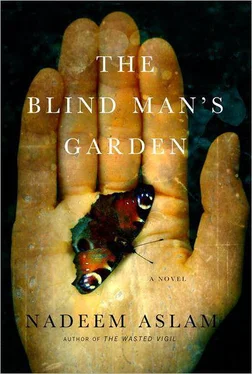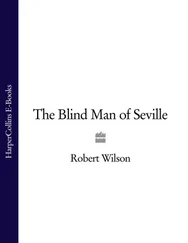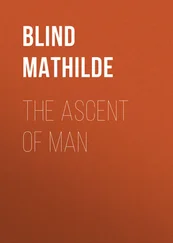It is another hour before a truck appears in the distance, the driver agreeing to tow him to the nearest mechanic’s shop, telling him during the journey that his cousin died fighting in Afghanistan last autumn and that his brother is in American custody in Cuba.
But by half past six in the evening the mechanics have still not finished with the repairs. Mikal realises he won’t be able to leave for Heer tomorrow morning: he’ll probably have to spend the night at Fatima’s sister’s house in Allah-Vasi after delivering the chains.
From the pickup he takes out the two empty bottles of Nestlé mineral water and fills them from the tap. ‘Can I make a call?’ he asks the owner of the mechanic’s shop, pointing to the grime-coated telephone sitting inside a cage meant for a bird. The little door has a padlock on it to prevent just anyone from using the instrument. ‘I’ll pay for it.’ Fatima’s husband has given him a few rupees for tea and a meal on the road.
Naheed answers on the fifth ring.
‘Are you on your way back?’ she asks.
‘I was hoping to leave tomorrow morning and be in Heer late the day after tomorrow. But now it looks difficult.’
Nothing from her. And he knows something is terribly wrong. ‘What is it?’ he says.
‘Sharif Sharif wants to marry me.’
‘I know that.’
‘He wants to marry me as soon as possible. This week. In a few days. Just a quick ceremony with a cleric and two witnesses.’
‘How did this happen?’
‘Father went to see him, to tell him that my agreement with him didn’t mean anything, and he became enraged. He is demanding what is his.’
‘He can’t marry you forcibly.’
‘He seems to think so. And Mother doesn’t wish to get the police involved.’
‘I am coming.’
‘Father says he will not accept a single rupee from me if I marry him. He says, “I don’t want my eyes and I don’t want to have a home if it’ll come at the expense of your happiness. I’d rather be a homeless blind beggar.”’
‘I am coming.’
He hangs up and stands there in a daze for a few moments. The mechanic comes and tells him the pickup is ready. So happy is the man with his patching job that he asks Mikal’s permission to sign the engine with a screwdriver.
Dusk will fall soon after seven. It’s six fifty when Mikal sets off towards Sara to deliver the chains. The sinking of the sun dissolves all hardness from the landscape, the mineral brilliance of the hills increasing for a short period. In the setting sun he watches a cloud as white as snow, a bright scarlet cloud, a green cloud edged with yellow like a dying leaf, a pale blue and a bronze cloud. But soon the sky above him is deep blue and the stars have appeared. He leaves the road that winds between the hills and begins to guide himself by the constellations through the open desert, hoping to travel in a straight line. In a hurry to drop off the chains.
Within half an hour the desert has surrendered itself completely to darkness. When he sees the shape lying on the ground ahead, he applies the brakes with as much force as he can, the tyres screeching on the gypsum and sun-split shale. He waits for the dust raised in front of the windscreen to settle, the beams of the headlights boring into it, and then sits looking out, suspended at the very edge of his senses, his heart thumping. After a while he gets out. He stands motionless beside the vehicle’s open door and then moves closer to one of the headlights, to be clearly visible. He undoes the buttons at his neck and wrists and takes off his shirt very slowly, performing each action emphatically. Remembering Tara’s words about encountering djinns.
He throws the shirt sideways. Peeling off his skin.
He crouches and takes off his shoes and steps out of them and, again very clearly, kicks them aside.
Then he steps out of his trousers and throws them away from himself too.
Stars are falling across the expanse of the sky above him, innumerable and random, and, naked, wearing nothing but Naheed’s necklace, he moves forwards with great deliberation. The headlights are reaching the figure lying on the ground and he is halfway there when he sees that it is a white man, sees the face. His pale skin and yellow-gold hair brilliant in the headlights. He is lying on his side, unconscious or dead, eyes closed and the right arm bloody.
Mikal stands still, breathing silently, and is about to take a step towards him when there is a movement in one of the hands.
He backs away and rushes towards the pickup, almost at a run. Collecting his clothes he begins to dress as fast as he can, looking around. If there is one there could be more. He glances up at the sky for Chinook helicopters and for fighter jets, a coursing of adrenalin in his veins. Someone will soon appear out of the darkness, he knows. He climbs into the pickup, wishing only to be out of there as quickly as possible, but just as the headlights swing away from the American soldier the snow leopard cub raises its head from behind the man’s shoulder.
Carefully he brings the headlights back onto the white man, the daunting impenetrability of the face, onto the snow leopard’s glowing eyes. The markings on the fur look as though the creature is in khaki camouflage.
He climbs out and calls to it but it doesn’t come, the head turned sideways as it stares into the night with eyes full of a green and ancient calm. Watchfully Mikal draws near and with his arm at full stretch lifts it by the scruff of its neck, noticing the small increase in heaviness from the last time he picked it up. How many days ago? He runs his eyes onto the white man’s body, the khaki shalwar kameez he is wearing. He walks around him in a wide circle unable to comprehend fully what he is seeing. He is much bigger than Mikal and looks to be five or six years older, though Mikal doesn’t know how good he is at judging a white person’s age. Moving closer, he places his hand on the chest to feel for the heartbeat but he’s wearing a bullet-proof vest under the kameez. Mikal checks the pulse instead. The right arm is bleeding, the upper bone broken above the elbow, and the blood is warm on Mikal’s fingers.
He looks for weapons. There is a folding-stock AK-47 slung over the shoulder and a 9 mm pistol strapped to the right thigh in a holster. There is another pistol in the small of his back. In the flank pocket of the kameez he finds two hundred dollars and a set of cards with English writing on them. There is a ‘blood chit’ to be used in case of capture — it’s in Pashto and English, and offers a cash reward to anyone who gives assistance to an American soldier in distress. Next he opens the man’s rucksack and finds a spare magazine for the AK-47, enough Meals, Ready-to-Eat for five days, a water bottle and water purification tablets. Small heavy cans with pictures of cats on them. He checks for a laptop computer. He extracts the large satellite phone from its holster and smashes it under his heels and then pulverises it completely with a rock.
The man is bull-necked and his body is hard, containing muscles full of health in every place. Hands like a stonemason’s. He must be either a Special Forces soldier or a CIA paramilitary officer, thinks Mikal. He looks for a digital camera like the one on which they had shown him pictures of the women, after his capture at the mosque back in January, but there isn’t one.
He looks at the dizzying height of the constellations and the stars, the thin millions of them stretching as far as the eye can see, southwards, northwards, eastwards, westwards, and he looks around the flat desert with its iron ore that is smelted by the Waziri tribes, the stone hills and the coralline beds and the waiting world. No sound except the pickup’s idling engine. He takes the rucksack and the guns and puts them in the footwell on the passenger’s side, placing the cub on the passenger seat itself. Getting behind the steering wheel, he swings the pickup around and puts it in reverse, backing it slowly towards the soldier, using his own footprints running from under the pickup to steer by. He stops when he is just a yard or so away from where the American lies. He alights to examine the distance and then gets back in and carefully reverses again until he is only half a yard from the soldier.
Читать дальше












